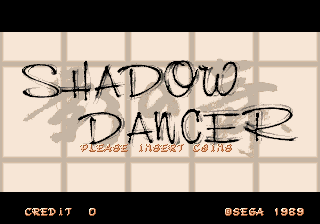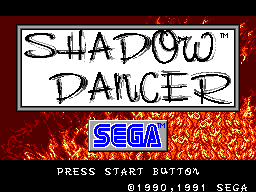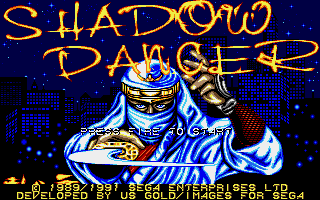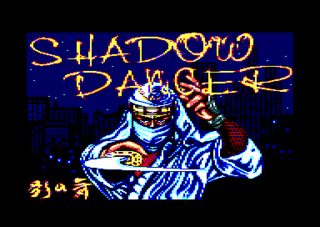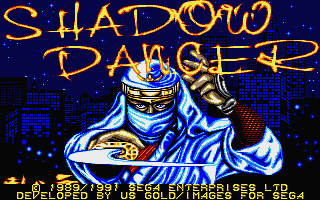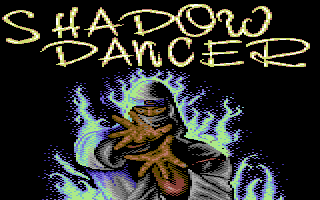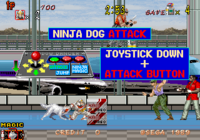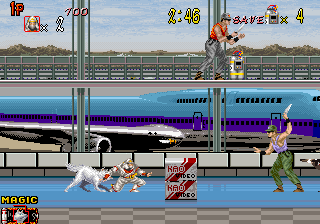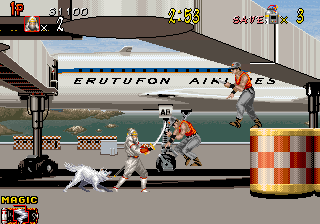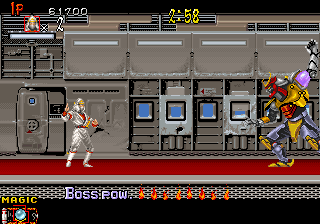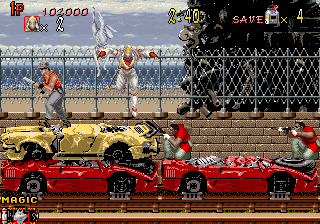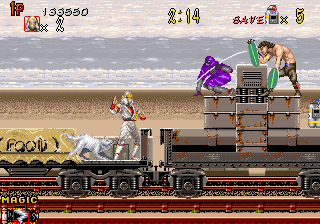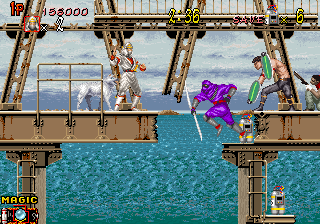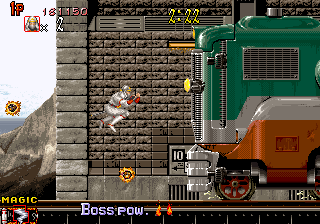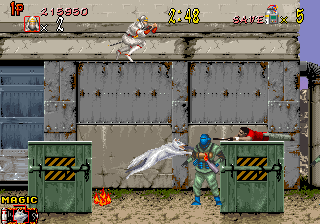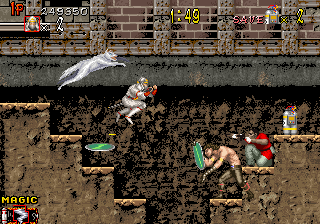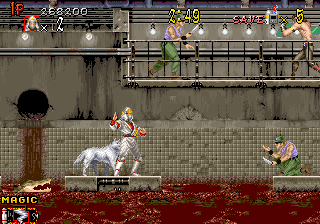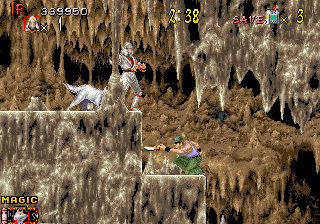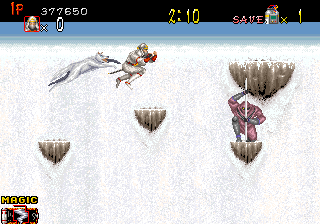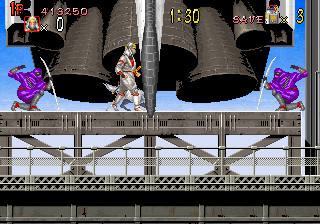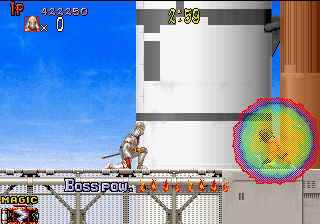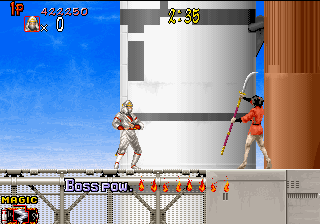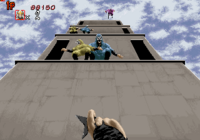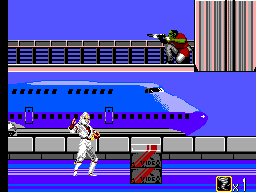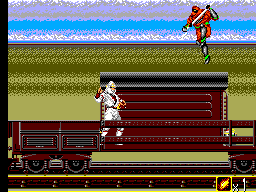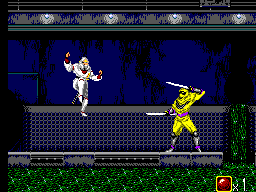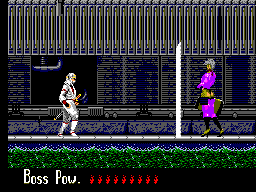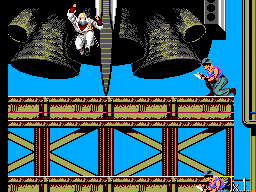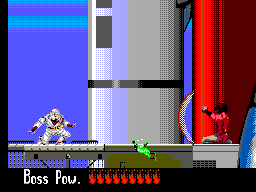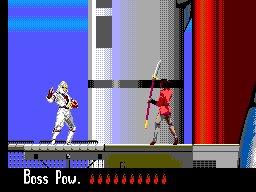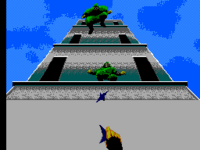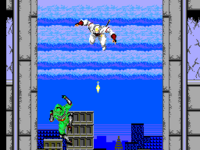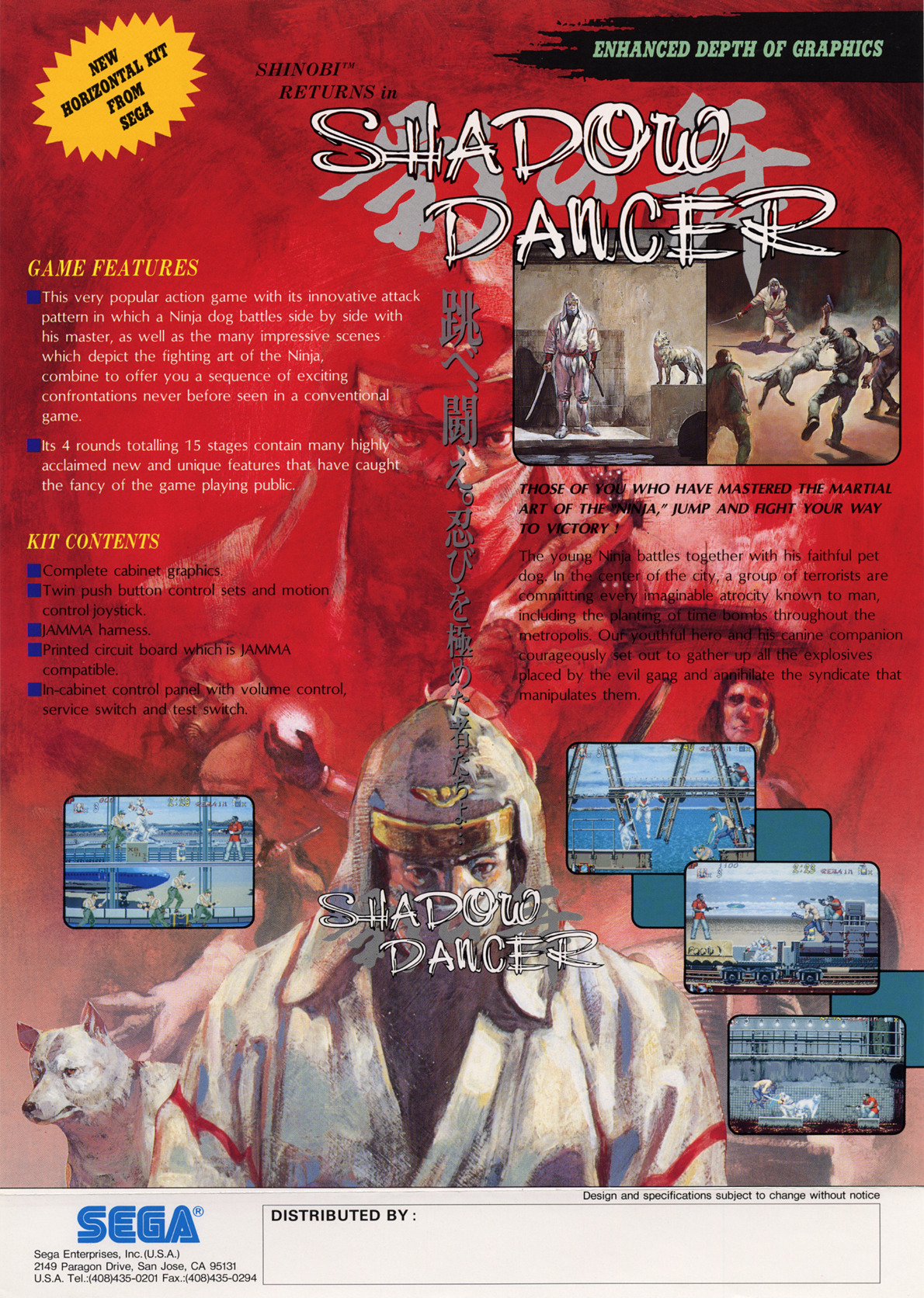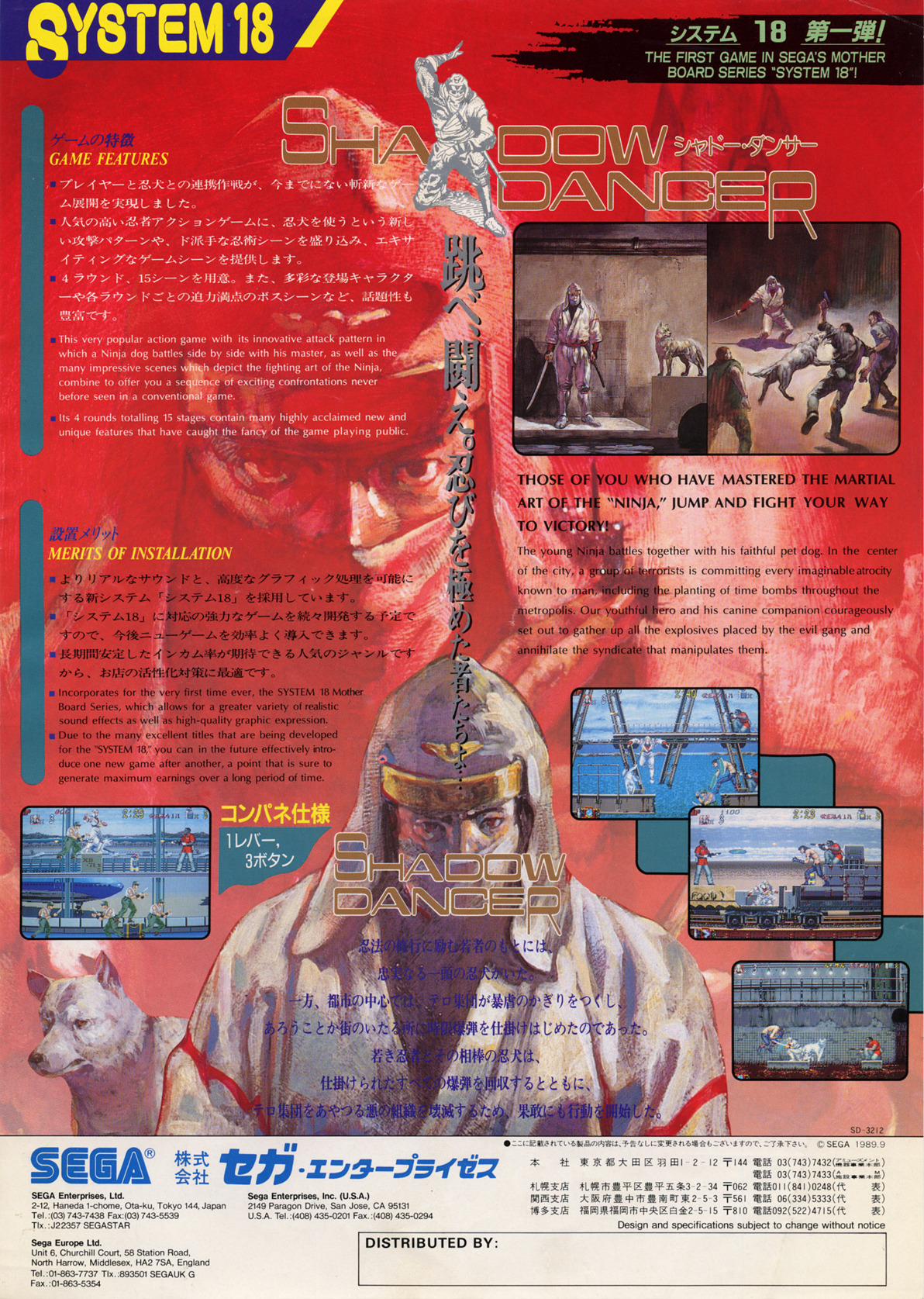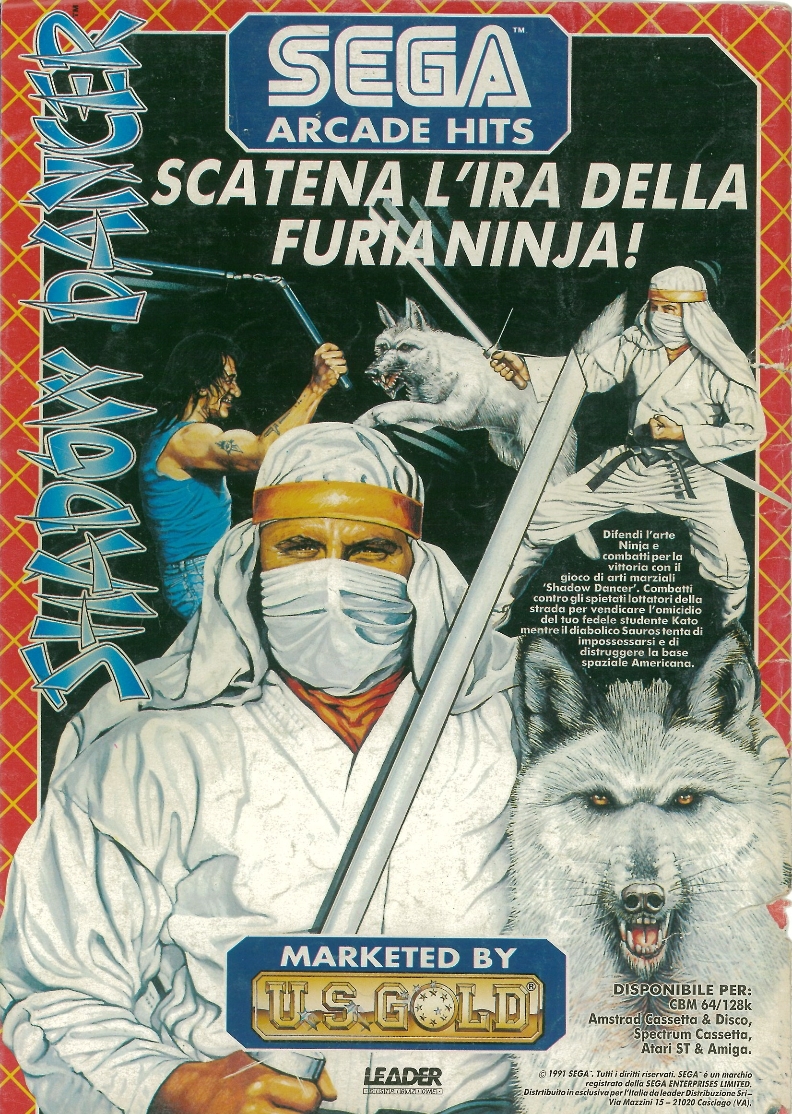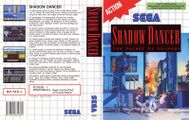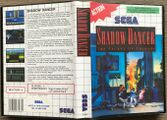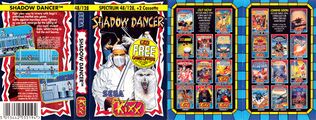Difference between revisions of "Shadow Dancer"
From Sega Retro
Hyperspeed34 (talk | contribs) |
|||
| (23 intermediate revisions by 4 users not shown) | |||
| Line 15: | Line 15: | ||
| tab6=Commodore 64 | | tab6=Commodore 64 | ||
| tab7=ZX Spectrum | | tab7=ZX Spectrum | ||
| − | | publisher={{company|[[Sega]]|system=SYS18,SMS}} | + | | publisher={{company|[[Sega Enterprises, Ltd.]]|system=SYS18,SMS}} |
{{company|[[U.S. Gold]]|system=Amiga,CPC,ST,C64,Spectrum}} | {{company|[[U.S. Gold]]|system=Amiga,CPC,ST,C64,Spectrum}} | ||
| developer={{company|[[Sega R&D 1]]{{ref|https://web.archive.org/web/20200904154509/https://twitter.com/tsurumy/status/1301909105804677120}}|system=SYS18}} | | developer={{company|[[Sega R&D 1]]{{ref|https://web.archive.org/web/20200904154509/https://twitter.com/tsurumy/status/1301909105804677120}}|system=SYS18}} | ||
{{company|[[Images]]{{ref|https://web.archive.org/web/20020418035938/http://www.climax.co.uk:80/retro/shadowdancer.htm}}{{magref|nce|144|48}}|system=Amiga,CPC,ST,C64,Spectrum}} | {{company|[[Images]]{{ref|https://web.archive.org/web/20020418035938/http://www.climax.co.uk:80/retro/shadowdancer.htm}}{{magref|nce|144|48}}|system=Amiga,CPC,ST,C64,Spectrum}} | ||
| + | | distributor={{company|[[Tec Toy]]|region=BR|system=SMS}} | ||
| + | {{company|[[Samsung]]|region=KR|system=SMS}} | ||
| + | | licensor = {{company|[[Sega Enterprises, Ltd.]]|system=Amiga,CPC,ST,C64,Spectrum}} | ||
| system=[[Sega System 18]], [[Sega Master System]], Amiga, Atari ST, Amstrad CPC, Commodore 64, ZX Spectrum | | system=[[Sega System 18]], [[Sega Master System]], Amiga, Atari ST, Amstrad CPC, Commodore 64, ZX Spectrum | ||
| players=1 | | players=1 | ||
| Line 29: | Line 32: | ||
| sms_date_eu=1991-11{{magref|segapower|25|11}} | | sms_date_eu=1991-11{{magref|segapower|25|11}} | ||
| sms_code_eu=9009 | | sms_code_eu=9009 | ||
| − | | sms_date_uk=1991-11{{magref|segapower|25|11}} | + | | sms_date_uk=1992-01{{magref|segapro|4|7}}{{magref|ctw|369|19}}<!--1991-11{{magref|segapower|25|11}}, 1992-02-03{{magref|gamesx|35|6}}--> |
| sms_code_uk=9009 | | sms_code_uk=9009 | ||
| sms_rrp_uk=32.99{{magref|segapro|5|40}} | | sms_rrp_uk=32.99{{magref|segapro|5|40}} | ||
| Line 68: | Line 71: | ||
}} | }} | ||
}} | }} | ||
| − | '''''{{PAGENAME}}''''' (シャドー・ダンサー), known as '''''Shadow Dancer: The Secret of Shinobi''''' on the Master System covers, is an action platform game developed by [[Sega]] for the [[Sega System 18]] arcade system in 1989. A port of the game was published by Sega for the [[Sega Master System]], and ports to several home computers were published by [[U.S. Gold]]. It was the first sequel to ''[[Shinobi]]'', alongside ''[[The Revenge of Shinobi]]''. | + | '''''{{PAGENAME}}''''' (シャドー・ダンサー), known as '''''Shadow Dancer: The Secret of Shinobi''''' on the Master System covers, is an action platform game developed by [[Sega Enterprises, Ltd.]] for the [[Sega System 18]] arcade system in 1989. A port of the game was published by Sega for the [[Sega Master System]], and ports to several home computers were published by [[U.S. Gold]]. It was the first sequel to ''[[Shinobi]]'', alongside ''[[The Revenge of Shinobi]]''. |
A similar game titled ''[[Shadow Dancer: The Secret of Shinobi]]'' was released for the [[Sega Mega Drive]], which features an entirely different set of stages. | A similar game titled ''[[Shadow Dancer: The Secret of Shinobi]]'' was released for the [[Sega Mega Drive]], which features an entirely different set of stages. | ||
| Line 293: | Line 296: | ||
As was to be expected, the two versions are very similar, however the Atari ST omits the introduction sequence to save space. Parallax scrolling is missing in both versions, as are the intermission screens. | As was to be expected, the two versions are very similar, however the Atari ST omits the introduction sequence to save space. Parallax scrolling is missing in both versions, as are the intermission screens. | ||
| + | |||
| + | ==Music and sound== | ||
| + | The music for the game, composed by [[Keisuke Tsukahara (composer)|Keisuke Tsukahara]], was based on the work of the group [[wikipedia:Geinoh Yamashirogumi|Geinoh Yamashirogumi]], who had performed the music for the influential 1988 film ''[[wikipedia:Akira (1988 film)|Akira]]''.{{ref|https://web.archive.org/web/20201207051056/https://twitter.com/ookayoshiki/status/1335813898402811906}} Tsukahara has said that [[wikipedia:World music|world music]] was gaining popularity at the time, so wrote the music based on traditional Indonesian music scales such as [[wikipedia:Pelog|Pelog]] and [[wikipedia:Slendro|Slendro]], with occasional rhythmic variation to create a "swaying" feeling. This was all generated using FM sound, as due to undisclosed reasons, Tsukahara was not able to use PCM sound, which by comparison were a common source of the music in his follow-up game 'Alien Storm''.{{fileref|ShinobiMusicCollection_CD_JP_Booklet.pdf|page=7}} | ||
==History== | ==History== | ||
| + | ===Development=== | ||
| + | The arcade game was developed by a separate team from the original ''[[Shinobi]]'', as creator [[Yutaka Sugano]] had relocated to [[Sega of America]]{{ref|https://web.archive.org/web/20230604181750/https://www.onemillionpower.com/astro-city-mini-and-game-design-part-2/}} and the other prominent members of [[Team Shinobi]] were busy developing ''[[Alien Storm]]''.{{ref|https://web.archive.org/web/20201207050215/https://twitter.com/ookayoshiki/status/1335811761786634240}} Therefore, [[Motoshige Hokoyama]] decided to redesign the game from the ground up.{{ref|https://web.archive.org/web/20230604181750/https://www.onemillionpower.com/astro-city-mini-and-game-design-part-2/}} | ||
| + | |||
| + | The game was originally called Nu Shinobi (抜忍),{{ref|https://web.archive.org/web/20201207045550/https://twitter.com/ookayoshiki/status/1335810154818768896}} a short version of Nuke Shinobi (抜け忍), meaning "runaway/fugitive shinobi", which would later be used to describe the original ''Shinobi'' protagonist Joe Musashi in the manual to the [[Shadow Dancer: The Secret of Shinobi|Mega Drive adapation]].{{fileref|Shadowdancer_md_jp_manual.pdf|page=4}}{{ref|https://vc.sega.jp/vc_shadow/}} The plot was going to involve the protagonist taking down a criminal organization to rescue of a kidnapped lover, but this was toned down as the trope had been overplayed.{{ref|https://web.archive.org/web/20201207045550/https://twitter.com/ookayoshiki/status/1335810154818768896}} | ||
| + | |||
===Legacy=== | ===Legacy=== | ||
| − | The ''Dead to Rights'' series by [[Namco]], which saw its first entry in 2002, | + | The ''Dead to Rights'' series by [[Namco]], which saw its first entry in 2002, features a dog called "Shadow" who can attack enemies on command, almost certainly a reference to this game. |
==Production credits== | ==Production credits== | ||
| − | + | {{mainArticle|{{PAGENAME}}/Production credits}} | |
| − | {{ | ||
| − | |||
| − | |||
| − | |||
| − | |||
| − | |||
| − | |||
| − | |||
| − | |||
| − | |||
| − | |||
| − | |||
| − | |||
| − | |||
| − | |||
| − | |||
| − | |||
| − | |||
| − | |||
| − | |||
| − | |||
| − | |||
| − | |||
| − | |||
| − | |||
| − | |||
| − | }} | ||
==Magazine articles== | ==Magazine articles== | ||
Latest revision as of 02:50, 8 November 2024
- For the Sega Mega Drive game, see Shadow Dancer: The Secret of Shinobi.
| |||||||||||||||||||||||||||||||||||||||||||||||||||||||||||||||||||||||||||||||||||||||||||||||||||||||||||||||||
| Shadow Dancer | |||||||||||||||||||||||||||||||||||||||||||||||||||||||||||||||||||||||||||||||||||||||||||||||||||||||||||||||||
|---|---|---|---|---|---|---|---|---|---|---|---|---|---|---|---|---|---|---|---|---|---|---|---|---|---|---|---|---|---|---|---|---|---|---|---|---|---|---|---|---|---|---|---|---|---|---|---|---|---|---|---|---|---|---|---|---|---|---|---|---|---|---|---|---|---|---|---|---|---|---|---|---|---|---|---|---|---|---|---|---|---|---|---|---|---|---|---|---|---|---|---|---|---|---|---|---|---|---|---|---|---|---|---|---|---|---|---|---|---|---|---|---|---|
| System(s): Sega System 18, Sega Master System, Amiga, Atari ST, Amstrad CPC, Commodore 64, ZX Spectrum | |||||||||||||||||||||||||||||||||||||||||||||||||||||||||||||||||||||||||||||||||||||||||||||||||||||||||||||||||
| Publisher: Sega Enterprises, Ltd. U.S. Gold | |||||||||||||||||||||||||||||||||||||||||||||||||||||||||||||||||||||||||||||||||||||||||||||||||||||||||||||||||
| Developer: Sega R&D 1[1] Images[2][3] | |||||||||||||||||||||||||||||||||||||||||||||||||||||||||||||||||||||||||||||||||||||||||||||||||||||||||||||||||
| Distributor: Tec Toy (BR) Samsung (KR) | |||||||||||||||||||||||||||||||||||||||||||||||||||||||||||||||||||||||||||||||||||||||||||||||||||||||||||||||||
| Licensor: Sega Enterprises, Ltd. | |||||||||||||||||||||||||||||||||||||||||||||||||||||||||||||||||||||||||||||||||||||||||||||||||||||||||||||||||
| Genre: Action[4][5] | |||||||||||||||||||||||||||||||||||||||||||||||||||||||||||||||||||||||||||||||||||||||||||||||||||||||||||||||||
| Number of players: 1 | |||||||||||||||||||||||||||||||||||||||||||||||||||||||||||||||||||||||||||||||||||||||||||||||||||||||||||||||||
|
Shadow Dancer (シャドー・ダンサー), known as Shadow Dancer: The Secret of Shinobi on the Master System covers, is an action platform game developed by Sega Enterprises, Ltd. for the Sega System 18 arcade system in 1989. A port of the game was published by Sega for the Sega Master System, and ports to several home computers were published by U.S. Gold. It was the first sequel to Shinobi, alongside The Revenge of Shinobi.
A similar game titled Shadow Dancer: The Secret of Shinobi was released for the Sega Mega Drive, which features an entirely different set of stages.
Contents
Story
| “ | 忍法の修行に励む若者のもとには、忠実なる一頭の忍犬がいた。 一方、都市の中心では、テロ集団が暴虐の限りをつくし、 あろうことか街のいたる所に時限爆弾を仕掛け始めたのであった。 若き忍者とその相棒の忍犬は、仕掛けられたすべての爆弾を回収するとともに、テロ集団をあやつる悪の組織を壊滅するため、果敢にも行動を開始した。 | „ |
| “ | The young Ninja battles together with his faithful pet dog. In the center of the city, a group of terrorists are committing known to man, including the planting of time bombs throughout the metropolis. Our youthful hero and his canine companion courageously set out to gather all the explosives placed by the evil gang and annihilate the syndicate that manipulates them. | „ |
In the Master System version, the main character is named Takeshi in the manual and Fuma in the attract sequence. No relationship to Joe Musashi is mentioned in either case. He is tasked with preventing a terrorist organization named Asian Dawn from taking control of an orbital space weapon system.
At the time of release, Shadow Dancer was not strictly affiliated with Shinobi in terms of plot, though the set-up is very similar to the original arcade game. The naming of the characters varies between home versions of the game, as do their motives.
Gameplay
System 18 version
Shadow Dancer expands on the gameplay seen in Shinobi. Like that game, it is a side-scrolling action game inspired by the likes of Namco's Rolling Thunder. The original game's move set remains intact. However, rather than saving children, the task is to defuse bombs (by touching them). All bombs in the stage must be defused to get to the next stage. Shinobi attacks by throwing shurikens, which are unlimited in supply. If an enemy is close, Shinobi uses a sword instead, which can pass through enemy defenses. Collecting half of the defused bombs turns shurikens into burning shurikens, causing double damage until the player completes the stage or loses a life. Shinobi can use ninja magic during battle, which kills all regular enemies or seriously damages the boss.
Most notably, the game adds a white dog named Yamato, who follows the protagonist around and can be used to take down enemies. The dog starts barking when Shinobi is crouched. By pressing the attack button while still crouched, the dog attacks the nearest enemy and holds him so that Shinobi can kill him. However, if player takes too long, the enemy pushes back the dog. If damaged, dog shrinks and can no longer assist the player for a duration until he grows back to normal size. Certain enemies, such as enemies with green shields and ninjas armed with swords, are immune to dog attacks. The dog cannot be used during boss fights.
There is no energy meter, so Shinobi loses a life is he is hit by an enemy attacks and must restart the stage from a predetermined checkpoint. Touching an enemy that is not attacking pushes him back without defeating him. Stages are also timed, with the player losing a life if time runs out. Extra lives can be earned in the bonus rounds.
Ninjutsu spells
All magic does the same damage and differs only in appearance. The game assigns a spell to player at the beginning of each stage. Ninjutsu spells can be used during boss battles.
Normally, these techniques can only be used once per stage, but if the player continues the game by inserting more coins and pressing START , Shinobi restarts the stage with two units instead of one.
| Tatsumaki Magic | |
|---|---|
| Summons tornadoes to destroy all enemies on screen. | |
| Fire Dog Magic | |
| Summons fire dogs to destroy all enemies on screen. | |
| Butsuzo Magic | |
| Summons a Buddha to destroy all enemies on screen. |
Items
| Time Bomb | |
|---|---|
| Shinobi must defuse all of the Time Bombs in each stage before finding the exit. | |
| Bonus Points | |
| Most Time Bombs give 500 or 1,000 bonus points when collected. | |
| Pow | |
| Collecting half of the Time Bombs gives a Pow bonus, which upgrades shurikens into burning shurikens, which do double damage and bypass enemy defenses. |
Missions
The first mission has three stages, but all the subsequent missions have four stages. The last stage of each mission is a boss encounter.
| Airport | |
|---|---|
| Set in an airport. After securing the main building, Shinobi must eliminate the terrorists in the apron and then fight the boss inside an airplane. The boss of the stage is a large enemy who wears samurai armor and is believed to be a robot. He attacks using bouncing fireballs and can only be hurt by attacking his arms when he raises it to throw fireballs. This boss also appears in the first round of the Mega Drive version. | |
| Train Yard | |
| Takes place inside a train yard and later on a moving train. Shinobi faces an armed locomotive which fires energy bolts. The boss can only be hurt by hitting the flashing optic sensor, which goes up and down across the locomotive's front armor. | |
| Sewers | |
| Starts in a ruined building and later continues in an alligator-infested sewer. The boss of the stage is a tall, leotard-wearing woman who attacks the player with steel slabs. She can only be hurt when she is throwing the slabs, during which time she deactivates the shield protecting her. A similar-looking boss appears in the third round of the Mega Drive version, with different attacks and different clothing. | |
| Launch Facility | |
| Takes place inside a spaceport. The boss of the stage is a woman carrying a naginata. She can only be hurt after she swipes her weapon, which makes her vulnerable for a second. |
Bonus round
Between each mission, there is a bonus stage seen from a first-person perspective where Shinobi he tosses shuriken at enemy ninjas dropping down from a building. The player is awarded an extra life for successfully completing the bonus round, but it is failed if a ninja makes it to the bottom and attacks Shinobi.
Master System version
The game is a faithful but abridged adaptation of the arcade game. Unlike the arcade version, it is not necessary to find bombs to defuse, though some enemies drop bombs that provide bonuses when touched. Shinobi walks with ![]() and
and ![]() and crouches with
and crouches with ![]() . He can move while crouching with
. He can move while crouching with ![]() and
and ![]() . The screen only scrolls forwards in this version, so the player cannot backtrack. Shinobi attacks with
. The screen only scrolls forwards in this version, so the player cannot backtrack. Shinobi attacks with ![]() by throwing shurikens at long range or using his sword on nearby enemies. Shurikens are unlimited. He jumps with
by throwing shurikens at long range or using his sword on nearby enemies. Shurikens are unlimited. He jumps with ![]() . Stages have multiple floors, which can be jumped between with
. Stages have multiple floors, which can be jumped between with ![]() +
+![]() and
and ![]() +
+![]() . Enemies on different floors cannot attack or be attacked.
. Enemies on different floors cannot attack or be attacked.
Shinobi has a special ninjutsu ability that can be used once per stage with ![]() +
+![]() to eliminate all enemies on screen. The ability is shown as an icon in the bottom-right corner of the screen. Shinobi is also accompanied by a canine companion named Yamato, though Yamato is not visible when not attacking and does not follow Shinobi around in this version of the game. While Shinobi is crouched, the icon changes to a picture of a dog. Once the icon has changed over completely, Shinobi summon his canine companion to attack by pressing
to eliminate all enemies on screen. The ability is shown as an icon in the bottom-right corner of the screen. Shinobi is also accompanied by a canine companion named Yamato, though Yamato is not visible when not attacking and does not follow Shinobi around in this version of the game. While Shinobi is crouched, the icon changes to a picture of a dog. Once the icon has changed over completely, Shinobi summon his canine companion to attack by pressing ![]() (while still crouched). Yamato holds the enemy in place for a duration and prevents him from attacking, allowing Shinobi to move in for the kill. This can be done up to three times per stage. Ninjutsu abilities and Yamato cannot be used during boss fights.
(while still crouched). Yamato holds the enemy in place for a duration and prevents him from attacking, allowing Shinobi to move in for the kill. This can be done up to three times per stage. Ninjutsu abilities and Yamato cannot be used during boss fights.
The game retains the one-hit kills of the arcade version (in contrast to the health gauge added to the Master System version of Shinobi). Shinobi loses a life when he is attacked by an enemy, though only bumping into an enemy does not do harm. There is no time limit in this version. Extra lives can be earned in the bonus rounds, which are played after each stage is completed.
Ninjutsu spells
Each stage gives the player a predetermined ninjutsu spell that can be cast once to kill all enemies on screen.
| Tatsumaki Magic | |
|---|---|
| Summons tornadoes to destroy all enemies on screen. | |
| Fire Dog Magic | |
| Summons fire dogs to destroy all enemies on screen. | |
| Butsuzo Magic | |
| Summons a Buddha to destroy all enemies on screen. |
Items
| Time Bomb | |
|---|---|
| Some enemies drop a Time Bomb when they are defeated, which Shinobi can collect for a bonus. | |
| Bonus Points | |
| Most Time Bombs give 1,000 bonus points when collected. | |
| Pow | |
| Every fifth Time Bomb gives a Pow bonus, which empowers Shinobi's shurikens. |
Missions
| Airport | |
|---|---|
| Map: 1️⃣ | |
| Freight Train | |
| Map: 1️⃣ | |
| Sewer | |
| Map: 1️⃣ | |
| Launching Pad | |
| Map: 1️⃣ | |
Bonus rounds
Bonus rounds are played after completing each stage. There are two bonus rounds.
The first is similar to the arcade version. Ninjas are traveling down a building, and Shinobi must throw shurikens at them from a first-person perspective. Shinobi moves his hands with ![]() or
or ![]() and throws shurikens with
and throws shurikens with ![]() or
or ![]() . The round is failed if a ninja makes it through and attacks Shinobi.
. The round is failed if a ninja makes it through and attacks Shinobi.
The second is similar to the Mega Drive version. Shinobi jumps off a building and throws shurikens at ninjas as he is falling. Shinobi moves with ![]() or
or ![]() and throws shurikens with
and throws shurikens with ![]() or
or ![]() .
.
In either round, the player is rewarded with an extra life for killing all of the ninjas.
Versions
Master System version
Shadow Dancer on the Master System retains a lot of the arcade game's content, but simplifies the graphics and sound to better suit the hardware. Stage layouts are slightly different, and the decision to use sprites similar in size to the arcade version means that fewer enemies can appear on screen at any one time. Sprite flicker is a common sight, and entire sections of stages are removed to save space. Unlike the arcade version, players cannot backtrack during either side-scrolling or boss sections, limiting player to a very small section of the screen during the boss fights.
The most striking omission in the Master System version of Shadow Dancer is the dog as an active character, but it is still available as a game mechanic. When a valid target is onscreen, the player must crouch. While crouched, the ninja magic icon will slowly transform into a a dog head. When the icon is completely full, it will move to the target enemy's location. Pressing attack will cause the dog to appear out of nowhere and attack the enemy. If no valid target exists, the icon will not move and pressing attack while crouched will perform a normal attack. The dog can be called only three times each stage.
The Master System version retains the first-person shuriken-throwing bonus rounds, but the one between the second and third stage is the same bonus round used by the Mega Drive version, which makes player to jump from a tall building and attack ninjas in a downward shoot-'em-up fashion.
Like the Master System version of Shinobi, ninja magic cannot be used during boss fights. In addition to the previously mentioned problem of being confined to a small section of the screen, this makes the boss fights even more difficult than the arcade version.
A small oddity, in the Master System version, Shinobi always bows to the boss before the battle.
Amstrad CPC and ZX Spectrum versions
The Amstrad CPC and ZX Spectrum versions of Shadow Dancer share similar cutbacks and are likely based on the same code. Both versions opt for a more zoomed-in look than is perhaps ideal, introducing extra vertical scrolling. Music is nonexistent (save for the title screen if running on a 128kB Spectrum) and sound effects are limited. Both also omit some backgrounds, presumably to save space.
The Amstrad uses more colours but the Spectrum runs in a higher screen resolution.
Commodore 64 version
On the Commodore 64, Shadow Dancer has no in-game music. While the backgrounds are simplified considerably on the C64, an attempt was made to retain the parallax scrolling, which is missing in most home versions of the game.
Amiga and Atari ST versions
Climax (under the name of Images Software Ltd[3][14]) created the Amiga and Atari ST versions simultaneously, targeting the ST first and then porting the game's contents to the Amiga, where minor improvements would be added[15]. Sega did not give the team access to the game's source code, so sprites were copied from a video of the game and touched up in the Atari ST version of OCP Art Studio[15].
As was to be expected, the two versions are very similar, however the Atari ST omits the introduction sequence to save space. Parallax scrolling is missing in both versions, as are the intermission screens.
Music and sound
The music for the game, composed by Keisuke Tsukahara, was based on the work of the group Geinoh Yamashirogumi, who had performed the music for the influential 1988 film Akira.[16] Tsukahara has said that world music was gaining popularity at the time, so wrote the music based on traditional Indonesian music scales such as Pelog and Slendro, with occasional rhythmic variation to create a "swaying" feeling. This was all generated using FM sound, as due to undisclosed reasons, Tsukahara was not able to use PCM sound, which by comparison were a common source of the music in his follow-up game 'Alien Storm.[17]
History
Development
The arcade game was developed by a separate team from the original Shinobi, as creator Yutaka Sugano had relocated to Sega of America[18] and the other prominent members of Team Shinobi were busy developing Alien Storm.[19] Therefore, Motoshige Hokoyama decided to redesign the game from the ground up.[18]
The game was originally called Nu Shinobi (抜忍),[20] a short version of Nuke Shinobi (抜け忍), meaning "runaway/fugitive shinobi", which would later be used to describe the original Shinobi protagonist Joe Musashi in the manual to the Mega Drive adapation.[21][22] The plot was going to involve the protagonist taking down a criminal organization to rescue of a kidnapped lover, but this was toned down as the trope had been overplayed.[20]
Legacy
The Dead to Rights series by Namco, which saw its first entry in 2002, features a dog called "Shadow" who can attack enemies on command, almost certainly a reference to this game.
Production credits
- Main article: Shadow Dancer/Production credits.
Magazine articles
- Main article: Shadow Dancer/Magazine articles.
Promotional material
also published in:
- Computer & Video Games (UK) #116: "July 1991" (1991-06-15)[23]
Physical scans
System 18 version
| Sega Retro Average | ||||||||||||||
|---|---|---|---|---|---|---|---|---|---|---|---|---|---|---|
|
| 74 | |
|---|---|
| Based on 2 reviews | |
Master System version
| Sega Retro Average | ||||||||||||||||||||||||||||||||||||||||||||||||||||||||||||||||||||||||||||||||||||
|---|---|---|---|---|---|---|---|---|---|---|---|---|---|---|---|---|---|---|---|---|---|---|---|---|---|---|---|---|---|---|---|---|---|---|---|---|---|---|---|---|---|---|---|---|---|---|---|---|---|---|---|---|---|---|---|---|---|---|---|---|---|---|---|---|---|---|---|---|---|---|---|---|---|---|---|---|---|---|---|---|---|---|---|---|
|
| 62 | |
|---|---|
| Based on 16 reviews | |
| Master System, BX† |
|---|
Amiga version
| Sega Retro Average | |||||||||||||||||||||||||||||||||||||||||||||||||
|---|---|---|---|---|---|---|---|---|---|---|---|---|---|---|---|---|---|---|---|---|---|---|---|---|---|---|---|---|---|---|---|---|---|---|---|---|---|---|---|---|---|---|---|---|---|---|---|---|---|
|
| 74 | |
|---|---|
| Based on 9 reviews | |
| Amiga, UK (Kixx) |
|---|
| Amiga, ES |
|---|
|
Amstrad CPC version
| Sega Retro Average | |||||||||
|---|---|---|---|---|---|---|---|---|---|
|
| 85 | |
|---|---|
| Based on 1 review | |
| Amstrad CPC, UK (cassette) |
|---|
|
| Amstrad CPC, UK (disk) |
|---|
|
| Amstrad CPC, UK (Kixx) |
|---|
| Amstrad CPC, ES (cassette) |
|---|
|
| Amstrad CPC, ES (disk) |
|---|
|
Atari ST version
| Sega Retro Average | |||||||||||||||||||||||||||||
|---|---|---|---|---|---|---|---|---|---|---|---|---|---|---|---|---|---|---|---|---|---|---|---|---|---|---|---|---|---|
|
| 73 | |
|---|---|
| Based on 5 reviews | |
| Atari ST, UK |
|---|
|
Commodore 64 version
| Sega Retro Average | ||||||||||||||||||||||||||||||||||
|---|---|---|---|---|---|---|---|---|---|---|---|---|---|---|---|---|---|---|---|---|---|---|---|---|---|---|---|---|---|---|---|---|---|---|
|
| 69 | |
|---|---|
| Based on 6 reviews | |
| Commodore 64, UK |
|---|
|
| Commodore 64, UK (Kixx) |
|---|
ZX Spectrum version
| Sega Retro Average | ||||||||||||||
|---|---|---|---|---|---|---|---|---|---|---|---|---|---|---|
|
| 93 | |
|---|---|
| Based on 2 reviews | |
| ZX Spectrum, UK |
|---|
|
| ZX Spectrum, UK (Kixx) |
|---|
| ZX Spectrum, ES |
|---|
|
Technical information
ROM dump status
| System | Hash | Size | Build Date | Source | Comments | |||||||||
|---|---|---|---|---|---|---|---|---|---|---|---|---|---|---|
| ✔ |
|
512kB | Cartridge (EU/BR) |
References
- ↑ @tsurumy on Twitter (Wayback Machine: 2020-09-04 15:45)
- ↑ http://www.climax.co.uk:80/retro/shadowdancer.htm (Wayback Machine: 2002-04-18 03:59)
- ↑ 3.0 3.1 New Computer Express, "10th August 1991" (UK; 1991-08-08), page 48
- ↑ File:ShadowDancer SMS EU cover.jpg
- ↑ File:ShadowDancer SMS KR cover.jpg
- ↑ Sega Arcade History, Enterbrain, page 101
- ↑ Sega Power, "December 1991" (UK; 1991-10-30), page 11
- ↑ Sega Pro, "February 1992" (UK; 1992-01-16), page 7
- ↑ Computer Trade Weekly, "" (UK; 1992-01-13), page 19
- ↑ 10.0 10.1 Sega Pro, "March 1992" (UK; 1992-02-20), page 40
- ↑ Ação Games, "Maio 1991" (BR; 1991-05-21), page 8
- ↑ 12.0 12.1 12.2 12.3 12.4 ACE, "June 1991" (UK; 1991-05-08), page 56
- ↑ 13.0 13.1 13.2 13.3 13.4 13.5 Computer & Video Games, "January 1991" (UK; 1990-12-15), page 155
- ↑ http://www.climax.co.uk:80/retro/index.htm (Wayback Machine: 2002-04-16 18:23)
- ↑ 15.0 15.1 File:CUAmiga UK 011.pdf, page 35
- ↑ @ookayoshiki on Twitter (Wayback Machine: 2020-12-07 05:10)
- ↑ File:ShinobiMusicCollection_CD_JP_Booklet.pdf, page 7
- ↑ 18.0 18.1 https://www.onemillionpower.com/astro-city-mini-and-game-design-part-2/ (Wayback Machine: 2023-06-04 18:17)
- ↑ @ookayoshiki on Twitter (Wayback Machine: 2020-12-07 05:02)
- ↑ 20.0 20.1 @ookayoshiki on Twitter (Wayback Machine: 2020-12-07 04:55)
- ↑ File:Shadowdancer_md_jp_manual.pdf, page 4
- ↑ https://vc.sega.jp/vc_shadow/
- ↑ Computer & Video Games, "July 1991" (UK; 1991-06-15), page 70
- ↑ Commodore User, "February 1990" (UK; 1990-01-26), page 91
- ↑ Svet Kompjutera, "Jul-Avgust 1992" (YU; 1992-xx-xx), page 57
- ↑ Consoles +, "Janvier 1992" (FR; 199x-xx-xx), page 114
- ↑ Console XS, "June/July 1992" (UK; 1992-04-23), page 144
- ↑ Mean Machines: The Essential Sega Guide, "" (UK; 1993-11-18), page 154
- ↑ Gamers, "Februar/März 1992" (DE; 1992-xx-xx), page 43
- ↑ Hobby Consolas, "Enero 1992" (ES; 199x-xx-xx), page 56
- ↑ Joypad, "Janvier 1992" (FR; 1991-12-1x), page 46
- ↑ Joystick, "Janvier 1992" (FR; 199x-xx-xx), page 160
- ↑ Mega Force, "Novembre 1991" (FR; 1991-11-19), page 79
- ↑ Mean Machines, "January 1992" (UK; 1991-12-27), page 54
- ↑ Mean Machines Sega, "October 1992" (UK; 1992-09-xx), page 136
- ↑ Player One, "Janvier 1992" (FR; 199x-xx-xx), page 74
- ↑ Play Time, "3/92" (DE; 1992-02-05), page 93
- ↑ Sega Pro, "April 1993" (UK; 1993-03-11), page 72
- ↑ Sega Force, "March 1992" (UK; 1992-02-20), page 56
- ↑ Video Games, "1/92" (DE; 1992-02-03), page 35
- ↑ Amiga Power, "June 1991" (UK; 1991-05-23), page 82
- ↑ 42.0 42.1 42.2 Aktueller Software Markt, "August/September 1991" (DE; 1991-07-26), page 58
- ↑ Games-X, "3rd May 1991" (UK; 1991-04-26), page 16
- ↑ 44.0 44.1 44.2 Joystick, "Juin 1991" (FR; 1991-0x-xx), page 192
- ↑ Megazone, "August/September 1991" (AU; 1991-xx-xx), page 50
- ↑ 46.0 46.1 Power Play, "8/91" (DE; 1991-07-1x), page 39
- ↑ Raze, "July 1991" (UK; 1991-05-30), page 38
- ↑ 48.0 48.1 Zzap!64, "May 1991" (UK; 1991-04-xx), page 68
- ↑ Games-X, "7th-13th June 1991" (UK; 1991-06-07), page 22
- ↑ ST Action, "June 1991" (UK; 1991-05-xx), page 74
- ↑ ST Format, "August 1991" (UK; 1991-07-11), page 64
- ↑ Commodore Force, "August 1993" (UK; 1993-06-24), page 20
- ↑ Commodore Format, "April 1991" (UK; 1991-03-21), page 36
- ↑ Zzap!, "Maggio 1991" (IT; 1991-xx-xx), page 26
- ↑ Games-X, "8th-14th August 1991" (UK; 1991-08-08), page 35
- ↑ Sinclair User, "July 1991" (UK; 1991-06-15), page 14
| Shadow Dancer | |
|---|---|
|
Main page | Comparisons | Maps | Credits | Hidden content | Bugs | Magazine articles | Reception | Bootlegs | |
- 1 player games
- All arcade games
- System 18 games
- 1989 System 18 games
- All 1989 games
- EU Master System games
- All EU games
- UK Master System games
- All UK games
- AU Master System games
- All AU games
- MX Master System games
- All MX games
- BR Master System games
- All BR games
- KR Master System games
- All KR games
- Master System games
- 1991 Master System games
- All 1991 games
- Master System action games
- All action games
- ES Amiga games
- All ES games
- UK Amiga games
- Amiga games
- 1991 Amiga games
- UK Atari ST games
- Atari ST games
- 1991 Atari ST games
- ES Amstrad CPC games
- UK Amstrad CPC games
- Amstrad CPC games
- 1991 Amstrad CPC games
- UK Commodore 64 games
- Commodore 64 games
- 1991 Commodore 64 games
- ES ZX Spectrum games
- UK ZX Spectrum games
- ZX Spectrum games
- 1991 ZX Spectrum games
- All games
- Old technical information
- Shadow Dancer
- Shinobi (franchise)
